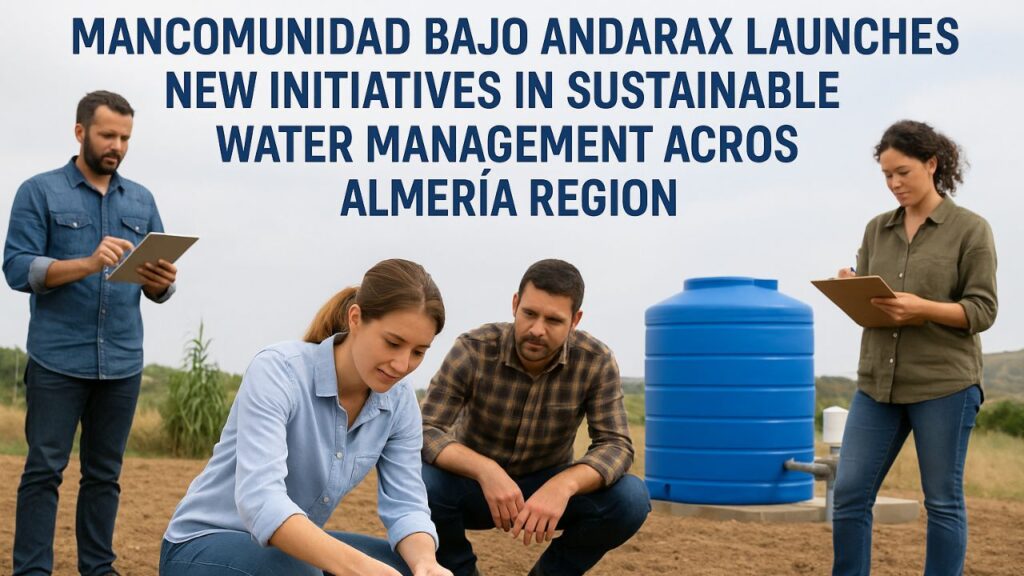Sustainable Water Management – Water scarcity has long been a pressing issue in the arid landscapes of southern Spain, particularly in the Almería region. In response to the growing environmental challenges and the urgent need for efficient water usage, the Mancomunidad del Bajo Andarax has launched a series of groundbreaking initiatives focused on sustainable water management. These efforts aim to modernize infrastructure, promote efficient irrigation, integrate smart technologies, and engage the local community in water conservation strategies.

Understanding the Need: Almería’s Water Crisis
Almería, known for its semi-arid climate, is heavily reliant on innovative water solutions to support its population and agriculture. The region faces:
- Low rainfall levels averaging less than 250 mm annually
- High demand for irrigation in greenhouse-based agriculture
- Growing urban consumption due to population growth
- Declining groundwater levels from over-extraction
The Mancomunidad Bajo Andarax, a collective of municipalities in the area, recognized that without strategic interventions, water insecurity could intensify in the coming years.
 Weekend Rain Alert September 2025 – Heavy Rainfall to Impact Several South African Regions
Weekend Rain Alert September 2025 – Heavy Rainfall to Impact Several South African Regions
Key Initiatives Launched by Mancomunidad Bajo Andarax
1. Upgrading Irrigation Systems for Agriculture
One of the main goals of the new program is to replace traditional irrigation methods with high-efficiency drip irrigation and automated watering systems. These modern technologies help reduce water waste and increase crop yields.
- Partnerships with local farmers
- Government-backed subsidies for system upgrades
- Training workshops for agricultural workers
2. Smart Metering and Leak Detection
In urban areas, smart meters are being installed to monitor real-time water usage. Additionally, AI-powered leak detection systems have been introduced to detect and fix pipeline damage quickly.
- Pilot program launched in Huércal de Almería
- Plans to expand to 6 other municipalities in the coming year
- Expected to reduce household water loss by 20%
3. Recycled Water for Non-Potable Use
The Mancomunidad has invested in advanced water treatment facilities to purify wastewater for reuse in gardening, street cleaning, and industrial processes.
- Aims to recycle up to 35% of used water by 2026
- Partnerships with environmental NGOs and tech firms
- Public awareness campaigns on water reuse
4. Public Education & Youth Engagement
Water sustainability begins with awareness. Schools and community centers across the region are hosting educational sessions under the initiative “Agua para el Futuro” (Water for the Future).
- Educational kits distributed to over 1,000 students
- Local art and essay contests on water conservation
- Youth ambassador programs for environmental stewardship
Implementation Strategy and Budget
| Initiative | Budget Allocated (€) | Completion Target |
|---|---|---|
| Smart Meter Installation | 1.2 million | Q4 2025 |
| Irrigation Modernization | 2.5 million | Q1 2026 |
| Recycled Water Infrastructure | 1.8 million | Q3 2025 |
| Public Awareness Campaigns | 300,000 | Ongoing |
| Leak Detection & Monitoring System | 700,000 | Q2 2026 |
Funding is a mix of EU environmental grants, regional budgets, and public-private partnerships.
Impact on Local Communities
The initiatives will benefit more than 65,000 residents across multiple municipalities, including:
 Youth Support Grant R12,500 September 2025 – Applicants Advised to Prepare Documents Early
Youth Support Grant R12,500 September 2025 – Applicants Advised to Prepare Documents Early
- Huércal de Almería
- Viator
- Gádor
- Benahadux
- Pechina
- Rioja
- Santa Fe de Mondújar
By reducing dependency on aquifers and improving overall water efficiency, the project is expected to:
- Cut regional water usage by 30% over 5 years
- Improve agricultural output by 15–20%
- Enhance water resilience during droughts
- Create over 150 green jobs in the water management sector
Environmental Significance
These efforts align with broader EU and UN environmental goals:
- UN SDG 6: Clean Water and Sanitation
- European Green Deal: Resource efficiency and climate resilience
- Adaptation to Climate Change: Reducing regional vulnerability to drought and desertification
The initiative also contributes to Spain’s national strategy to combat desertification, especially critical in provinces like Almería that are highly susceptible to climate extremes.
Collaborations and Stakeholder Involvement
The Mancomunidad is collaborating with:
- Agencia Andaluza del Agua for regulatory and technical guidance
- Universidad de Almería for environmental research and student involvement
- Local NGOs to drive community participation
- Private firms for AI-based infrastructure development
Regular stakeholder meetings and a dedicated online public dashboard ensure transparency and feedback integration throughout the project’s lifespan.
The initiatives by Mancomunidad Bajo Andarax are a forward-thinking response to Almería’s water challenges. By integrating innovation, community involvement, and sustainable practices, the region is positioning itself as a model for water resilience in semi-arid regions globally. These projects not only secure water for current residents but also protect the environment for future generations.
FAQs on Mancomunidad Bajo Andarax Water Initiatives
Q1. What is the main aim of these initiatives?
A: To promote sustainable water management and reduce dependency on groundwater through modern technology and community involvement.
Q2. Which areas are benefiting from the program?
A: Seven municipalities in the Bajo Andarax region, including Huércal de Almería, Pechina, and Gádor.
Q3. How is the water being recycled?
A: Through advanced water treatment plants that purify wastewater for non-drinking uses like street cleaning and irrigation.
Q4. What support is available to farmers?
A: Financial subsidies, technical support, and training on efficient irrigation practices.
Q5. How can citizens track the project’s progress?
A: Through an online dashboard updated regularly with stats, maps, and timelines by the Mancomunidad.



